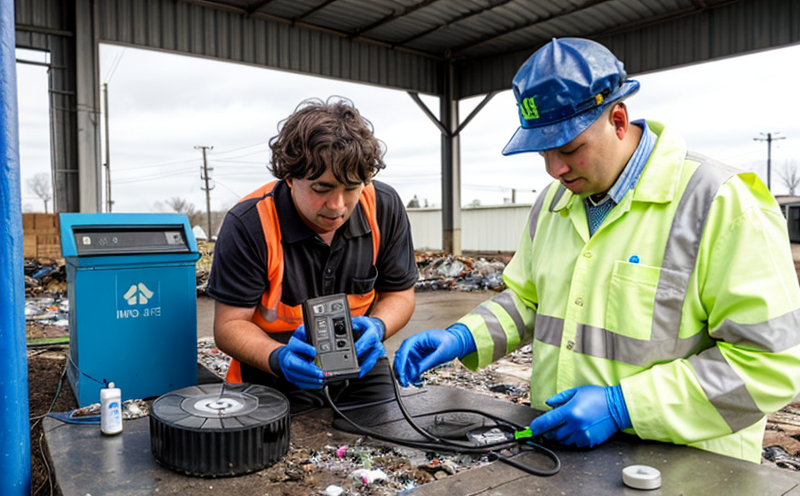ANSI C18.4 Lithium Battery Recycling Assessment
The ANSI C18.4 standard provides a framework for the recycling of lithium batteries, ensuring environmental safety and regulatory compliance. This service focuses on the evaluation of lithium battery materials to ensure they meet stringent requirements set by this standard.
Lithium batteries are widely used in consumer electronics, automotive, aerospace, and other sectors due to their high energy density. However, improper disposal can lead to hazardous waste and environmental contamination. The ANSI C18.4 standard helps manufacturers and recycling facilities identify safe methods for lithium battery recycling, ensuring that the process does not pose risks to human health or the environment.
The testing protocol involves several key steps:
- Sample preparation: Lithium batteries are disassembled into their constituent materials, including cathodes, anodes, electrolytes, and separators.
- Material characterization: The chemical composition of each component is analyzed to ensure it meets the specified criteria for recycling. This includes identifying trace metals like lithium, cobalt, nickel, and manganese.
- Hazard assessment: Tests are conducted to evaluate the potential hazards associated with the materials, such as flammability, reactivity, and toxicity.
- Performance evaluation: The recycled materials are tested for their suitability in new battery applications. This includes assessing their capacity retention, cycle life, and rate performance.
The ANSI C18.4 standard is crucial for industries that deal with lithium batteries, as it provides a roadmap for responsible recycling practices. By adhering to this standard, manufacturers can ensure that their waste management processes are both environmentally friendly and compliant with regulatory requirements.
Our laboratory uses state-of-the-art equipment and experienced personnel to conduct these assessments, ensuring accurate and reliable results. Our team of experts is dedicated to providing clients with comprehensive reports that outline the performance and safety of their lithium battery materials.
Industry Applications
- Consumer Electronics: This service is particularly useful for manufacturers and suppliers of portable electronic devices, such as smartphones, laptops, and tablets. It ensures that the batteries used in these products can be safely recycled.
- Automotive Industry: Electric vehicles require large quantities of lithium batteries. Our testing helps ensure that these batteries are properly recycled to recover valuable materials for use in new vehicle production.
- Aerospace: Lithium batteries are used in aircraft and spacecraft due to their high energy density. Proper recycling is essential to maintain safety standards and comply with regulations.
- R&D Engineers: This service supports the research and development of new lithium battery technologies, ensuring that they can be safely recycled at the end of their lifecycle.
Eurolab Advantages
At Eurolab, we pride ourselves on offering unparalleled expertise in waste management and recycling testing. Our team of experienced professionals is dedicated to providing accurate and reliable results that meet the highest industry standards.
- Accreditation: We are ISO/IEC 17025 accredited, ensuring that our laboratory meets the strictest quality and technical requirements.
- State-of-the-art equipment: Our advanced instrumentation allows us to conduct precise and thorough analyses of lithium battery materials.
- Comprehensive reports: We provide detailed reports that outline the performance and safety of your lithium battery materials, helping you make informed decisions.
- Client-focused approach: Our team works closely with clients to understand their specific needs and requirements, ensuring that our services meet their unique challenges.
Why Choose This Test
The ANSI C18.4 Lithium Battery Recycling Assessment is essential for any company involved in the production or recycling of lithium batteries. By adhering to this standard, you can ensure that your waste management processes are both environmentally friendly and compliant with regulatory requirements.
Our testing service offers several key benefits:
- Environmental responsibility: Proper recycling of lithium batteries helps reduce environmental pollution and promotes sustainable practices.
- Regulatory compliance: By meeting the criteria set by ANSI C18.4, you can avoid legal penalties and maintain a good reputation in the industry.
- Economic benefits: Recycling lithium batteries allows for the recovery of valuable materials, reducing costs associated with raw material procurement.





